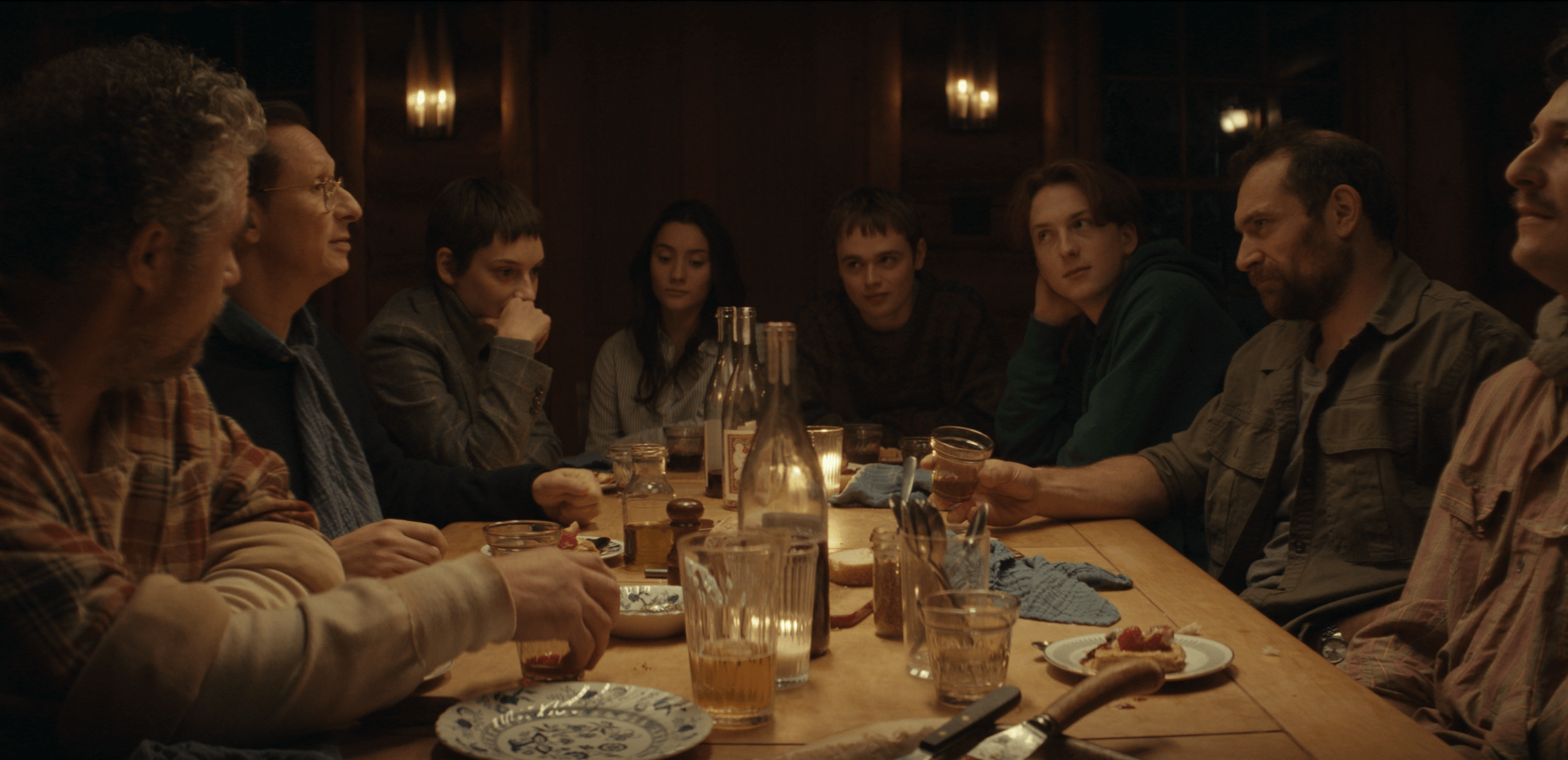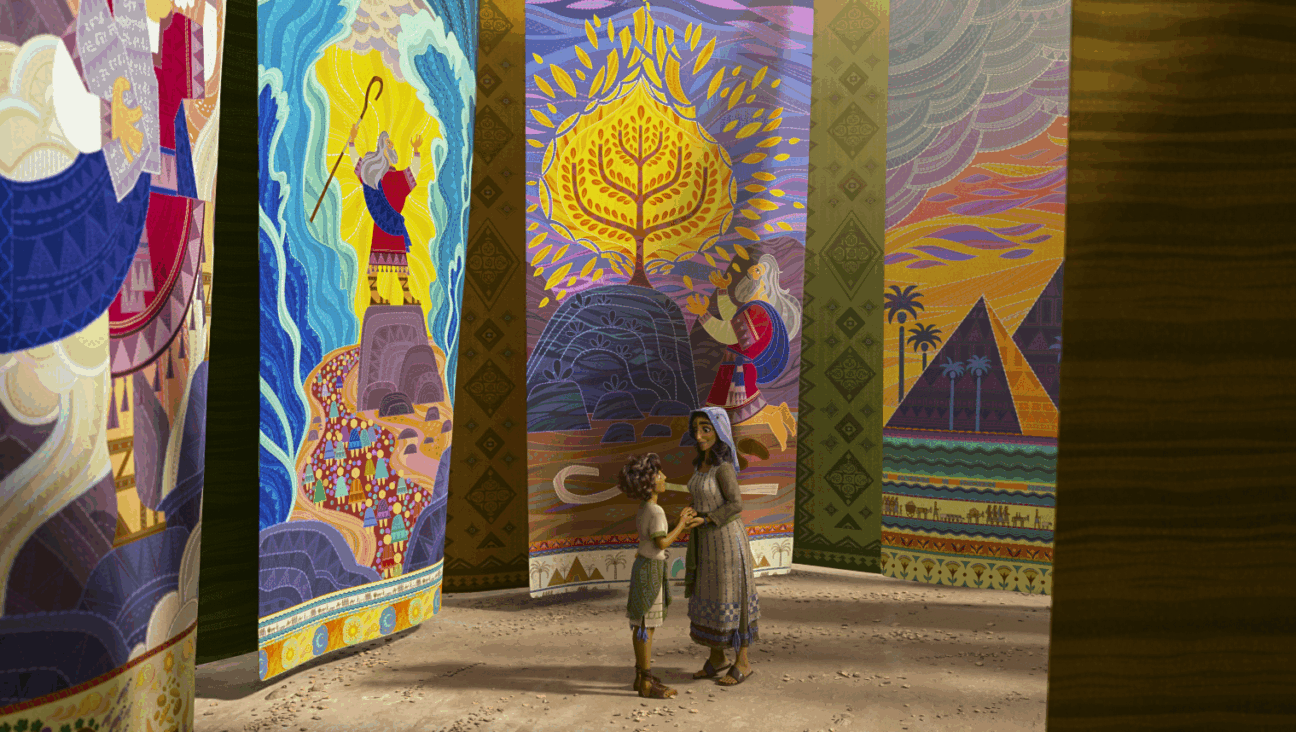How Leonard Cohen — and a Yom Kippur prayer — inspired a coming-of-age epic
Philippe Lesage’s ‘Who By Fire’ is about our vulnerability and our doubt

Guests at a remote cabin share a meal in Philippe Lesage’s Who by Fire. Courtesy of Film at Lincoln Center
Perhaps the most seasonally appropriate film running at the New York Film Festival isn’t the one that features a glimpse of a Yom Kippur service — that would be Brady Corbet’s The Brutalist — but a drama that doesn’t seem to have any Jewish characters at all.
Canadian director Philipe Lesage’s French language film Who By Fire, about a film-loving teen’s vacation to the home of a famous director, is named for a Leonard Cohen song inspired by liturgy recited on the Days of Awe.
“The title in French, it meant kind of nothing,” said Lesage on a Zoom call from his home in Montreal. “Comme le Feu sounds a bit blunt and boring in English. It means ‘Like Fire,’ which means nothing in particular.”
After the film wrapped, Lesage was having coffee with an actress friend who suggested the homage to Cohen, a fellow Montrealer, for the English title. A fan since his late teens, he loved the idea.
Lesage listened obsessively to Cohen’s 1992 album The Future, and says that “Waiting for the Miracle,” along with the St. Matthew Passion by Bach, may be the music he’s listened to most in his life.
While the characters in his film, holed up in a remote cabin, only reachable by seaplane, play traditional French Canadian folk music on guitar and dance to the B-52’s “Rock Lobster,” Lesage said he used to spin “Dance Me to the End of Love” at parties — in the peak days of Grunge no less — and get his friends waltzing.
Lesage was raised Catholic and considers himself agnostic, but he knew that Cohen’s “Who By Fire” was adapted from the Unetanneh Tokef, which lists some of the thousand ways to die in the coming year.
The main character of Jeff, a 17-year-old who looks unsuccessfully for a role model in the man hosting him, could have died by fire in an abandoned cabin. Another guest nearly dies by water while kayaking. The wilderness threatens, with baying wolves, but so too do guns and arrows and the less tangible slings described by Cohen: solitude, brave assent and, crucially, a lady’s command.
But, grounded as so much of the action is in a teenage boy’s mind, the lady in question — Jeff’s best friend’s sister, Aliocha — is not the threat he imagines. Aliocha has her own desires, and does not want to be reduced to the object of someone else’s. Everyone enters the wilderness with ideas about themselves and others, only to end up doubting them. Nearly everyone has something to atone for.
“What I can rely on in the Leonard Cohen song, I think, is that there’s a questioning with a sense of mysticism as well,” Lesage said. “You can see that he has a perception of life where it’s both love, eroticism, and religion kind of melted together.”
Lesage thinks the song and the film are also about human fragility, as the characters learn — or fail to learn — that it is in expressing our vulnerability that we can best be loved.
While Cohen’s music has never been used in Lesage’s work, the director has, in fact, used his words to explain the title of his previous film, 2018’s Genesis.
Screening it at the Jerusalem Film Festival in 2019, he worried his audience would be disappointed that there wasn’t much biblical about the film, which is about first love. Asked why he called it Genesis, he quoted Cohen, who said “Love is the only engine of survival.”
As for when Cohen’s music may end up on a future soundtrack, Lesage says he’s waiting for the proper time.
“I think I will at some point, and I think that if I do, it’s gonna be probably ‘Waiting for the Miracle,’” he said.
Philippe Lesage’s Who by Fire is playing Oct. 6, 7 and 8 as part of the New York Film Festival. More information can be found here.

















